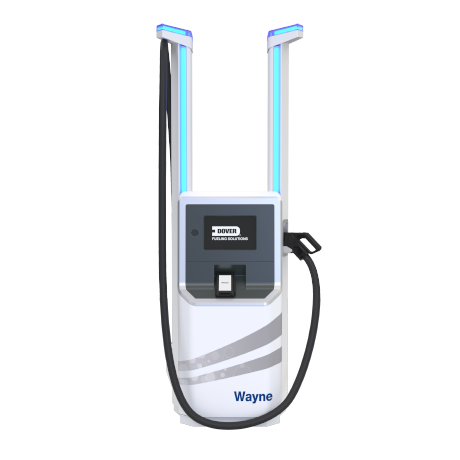Wayne PWR™ DC fast chargers
From the company that has brought you relentless reliability, innovative technology, and unparalleled consumer experience for over 130 years, Dover Fueling Solutions® brings quality, innovation, and reliability to electric vehicle (EV) charging with the Wayne PWR™ DC fast chargers. With five different configurations available, choose the best fit to meet your specific installation requirements.*
*Now available with NACS connector!


Generate New Revenue Streams and Unlock Driver Insights
Leverage EV charging data to glean insights and provide personalized experiences. Monitor status of chargers in real time with cloud-based charge station management system.
Unrivaled Manufacturing Quality
With the 130+ year Wayne legacy of excellence and innovation, and designed and manufactured in the USA, Wayne PWR™ features a sleek, compact, NEVI compliant design that is highly reliable and easy to maintain.
Engaging, Customizable Interface
Featuring an intuitive digital touchscreen and multi-language options, Wayne PWR™ chargers display power level, remaining time-to-full-charge, and energy consumption.
Easy, Secure Payments
Features easy and secure payments through POS agnostic Wayne iX Pay® direct to host payment platform, with Wayne iX Pay® 2 Payment Platform Plug and Charge integration coming soon.
Chad Bass, Director, Product Management - EV Charging
“Electric Vehicles are only one piece of the puzzle as countries strive to become carbon-neutral. The companies that can continue to improve existing fuel dispensing markets while developing new technology that provides leadership in the clean energy space will succeed. That is where DFS shines. We have over 130 years of experience designing and dispensing multiple energy sources, and with Wayne PWR™ chargers, we know we can improve the industry through relentless reliability.”
Comprehensive Service
Remote diagnostics, proactive monitoring, heartbeat checks with a nationwide service network.
Thoughtfully Designed
Allowing for custom branding on the exterior and digital screen, Wayne PWR™ chargers feature a sleek, compact aesthetic plus green and red post lights indicating charger status from a distance.



